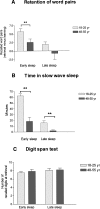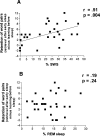Midlife decline in declarative memory consolidation is correlated with a decline in slow wave sleep
- PMID: 17522024
- PMCID: PMC1876757
- DOI: 10.1101/lm.470507
Midlife decline in declarative memory consolidation is correlated with a decline in slow wave sleep
Abstract
Sleep architecture as well as memory function are strongly age dependent. Slow wave sleep (SWS), in particular, decreases dramatically with increasing age, starting already beyond the age of 30. SWS normally predominates during early nocturnal sleep and is implicated in declarative memory consolidation. However, the consequences of changes in sleep across the life span for sleep-associated memory consolidation have not been evaluated so far. Here, we compared declarative memory consolidation (for word-pair associates) during sleep in young and middle-aged healthy humans. The age groups (18-25 vs. 48-55 yr) did not differ with regard to learning performance before retention periods that covered, respectively, the first and second half of nocturnal sleep. However, after early retention sleep, where the younger subjects showed distinctly more SWS than the middle-aged (62.3 +/- 3.7 min vs. 18.4 +/- 7.2 min, P < 0.001), retrieval of the word pairs in the middle-aged was clearly worse than in the young (P < 0.001). In contrast, declarative memory retention did not differ between groups after late sleep, where retention was generally worse than after early sleep (P = 0.005). Retention of declarative memories was the same in both age groups when sleep periods containing equal amounts of SWS were compared, i.e., across late sleep in the young and across early sleep in the middle-aged. Our results indicate a decline in sleep-associated declarative memory consolidation that develops already during midlife and is associated with a decrease in early nocturnal SWS.
Figures


References
-
- Ambrosini M.V., Giuditta A. Learning and sleep: The sequential hypothesis. Sleep Med. Rev. 2001;5:477–490. - PubMed
-
- American Psychiatric Association . Diagnostic and statistical manual of mental disorders, Fourth Edition, Text Revision (DSM-IV-TR) American Psychiatric Association; Washington, DC: 2000.
-
- Amthauer R., Brocke B., Liepmann D., Beauducel A. I-S-T 2000 R. Intelligenz-Struktur-Test 2000 R. Hogrefe Verlag; Göttingen: 2001.
-
- Backhaus J., Junghanns K. Daytime naps improve procedural motor memory. Sleep Med. 2006;7:508–512. - PubMed
-
- Backhaus J., Junghanns K., Broocks A., Riemann D., Hohagen F. Test-retest reliability and validity of the Pittsburgh Sleep Quality Index in primary insomnia. J. Psychosom. Res. 2002;53:737–740. - PubMed
Publication types
MeSH terms
LinkOut - more resources
Full Text Sources
Medical
